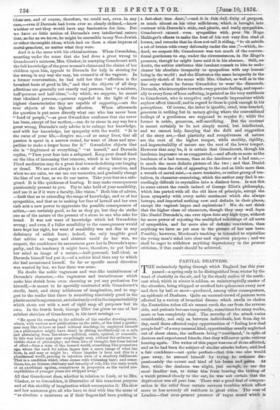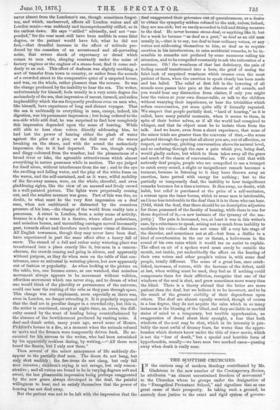PARTIAL DEAFNESS.
THE melancholy Spring through which England has this year passed—a spring only to be distinguished from winter by the want of elasticity in the air, and by the steady malice of the north- east wind, which in winter is seldom so uninterruptedly master of the situation, being whipped or soothed into quiescence every now and then by hail or snow—produced, among other consequences, an epidemic of Deafness. Quite an unusual crowd of persons were affected by a variety of bronchial disease which swells or chokes the Eustachian tubes till air cannot reach the ear from the reverse side, and patients become temporarily, sometimes for many weeks, more or less completely deaf. The severity of the attack varies considerably, not only as between individuals, but from day to day, until those affected enjoy opportunities of "feeling how deaf people feel" of a very unusual kind, opportunities usually neglected out of sheer alarm, the sufferers being "convinced," in spite of doctors and experienced friends, that they will never quite recover hearing again. The writer of this paper was one of those affected, and as he had been the subject of similar attacks before, and had a fair confidence—not quite perfect—that this one also would pass away, he amused himself by trying to estimate dis- passionately the extent and kind of his losses and gains. At first, while the deafness was slight, just enough, to use the most familiar test, to debar him from hearing the ticking of a watch pressed closely to the ear, he was not certain that the deprivation was all pure loss. There was a good deal of compen- sation in the relief from certain nervous troubles which affect more or less severely all residents in great cities. The roar of London—that ever-present pressure of vague sound which is never absent from the Londoner's ear, though sometimes forgot- ten, and which, unobserved, affects all London voices and all London music—was suddenly and incomprehensibly stilled, as in the earliest dawn. He says " stilled " advisedly, and not " sus- pended," for the roar must still have been audible in some faint degree, or the patient would have felt, what he did not feel,—that dreadful increase in the effect of Solitude pro- duced by the cessation of an accustomed and all-pervading noise, that severe shock of expectancy or dread which comes to men who, sleeping constantly under the noise of factory engines or the engines of a steam-boat, find it come sud- denly to an end. This effect of deafness was slightly soothing, a sort of transfer from town to country, or rather from the sounds of a crowded street to the comparative quiet of a carpeted house, and was, on the whole, rather pleasant than the reverse. So was the change produced by the inability to hear the sea. The writer, unfortunately for himself, feels usually in a very acute degree the melancholy of the sea, that impression of unrest, turmoil, and sullen implacability which the sea frequently produces even on men who, like himself, have experience of long and distant voyages. That the sea is unfriendly to everything in man, except, indeed, his digestion, was his permanent impression ; but being ordered to the sea-side while still deaf, he was surprised to find how completely this impression depended upon the sense of hearing. While still able to hear clear voices directly addressing him, he had lost the power of hearing either the plash of water against the piles of a pier, or the dull roar of the waves breaking on the shore, and with the sound the melancholy impression due to it had departed. The sea, though rough and dingy-coloured from the weather, had the pleasantness of a broad river or lake, the agreeable attractiveness which almost everything in nature possesses while in motion. The eye judged for itself alone, without interference from the ear ; and to the eye the swelling and falling water, and the play of the white foam on the waves, and the self-sustained, and as it were, wilful mobility of the far-away masses, were, on the whole, cheerful, and even gladdening sights, like the view of an amused and lively crowd in a well-painted picture. The lights were perpetually coming out, and the sombre murmur was gone. Part of this was due, no doubt, to what must be the very first impression on a deaf man, when not embittered or distracted by the conscious pressure of his loss,—the change of the world from reality into a panorama. A street in London, from a noisy scene of activity, became in a day a scene in a theatre, where silent pedestrians, and noiseless horses, and unrumbling carriages moved incessantly past, towards silent and therefore much nearer vistas of distance. All English townsmen, though they may never have been deaf, have experienced in part the same effect after a heavy fall of snow. The strand of a full and rather noisy watering-place was transformed into a place exactly like it, but seen in a camera- obscura, the crowds coming and going in silence, and apparently without purpose, as they do when seen on the table of that con- trivance, once so universal in watering-places, but now apparently out of fashion or popularity. As when looking at the picture on, -the table, too, one became aware, as one watched, that noiseless movement always appears to be movement without volition, effortless movement which can never stop, and to dream of what one would think of the placidity or permanence of the universe, 'could one hear the rushing of the orbs as they pass through space. This change was not unpleasant, more especially as there was, even in London, no danger attending it. It is popularly supposed that the deaf are in peculiar danger in a crowded city, but this is, the writer is convinced, except at night-time, an error, the diffi- ulty caused by the want of healing being counterbalanced by the absence of the bewilderment produced by rushing noise. A ,deaf-and-dumb artist, many years ago, saved some of Messrs. Pickford's horses in a fire, at a moment when the animals refused to move and the firemen were temporarily driven back. He ac- ,counted for his success to the writer, who had been astonished by his apparently reckless daring, by writing,—"All those men heard the flames, but I only saw them."
Then several of the minor annoyances of life suddenly dis- appear to the partially deaf man. The doors do not bang, but only shut audibly ; the fire-irons do not clang, but only fall avec intention; children's crying is not savage, but only remon- strative ; and all voices are found to be in varying degrees soft and sweet, the last pleasurable impression beilig perhaps exaggerated by the new grace always developed in the deaf, the painful willingness to hear, and so satisfy themselves that the power of hearing has not died away.
But the patient was not to be left with the impression that the deaf exaggerated their grievance out of-querulousness, or a desire to obtain the sympathy seldom refused to the sick, unless, indeed, they are sea-sick, but so rarely accorded in full and fitting measure to the deaf. He never became stone-deaf, or anything like it, but for a week he became "as deaf as a post," as deaf as an old man usually is,—that is to say, too deaf to hear ordinary voices, or any .
voices not addressing themselves to him, so deaf as to require exertion in his interlocutors, to miss accidental remarks, to be in- sensible to remarks not prefaced by some summons calling his attention, and to be compelled constantly to ask the reiteration of a sentence. Oh! the weariness of that last deficiency, the pain of feeling oneself transformed into a bore, the grief of seeing the faint look of surprised weariness which crosses even the most patient of faces, when the exertion to speak clearly has been made and has failed. The relief at first felt in the lowering of all sounds soon passes into pain at the absence of all sounds, and you would bear any distraction from clatter, if only you might hear the voices at your own dinner-table, or talk to the children without wearying their impatience, or hear the trivialities which soften conversation, yet seem quite silly if formally repeated. We suspect that people partially deaf, "hard of hearing," as it is called, have many painful moments, when it seems to them, in spite of their better selves, as if all the world had conspired to whisper, and that its object must be to isolate them from the talk. And we know, even from a short experience, that none of the minor trials are greater than the converse of that,—the sense gathered through the eyes that all about you are, out of affection, or respect, or courtesy, pitching conversation above its natural level, and so enduring through the ears a pain which you, being deaf, would gladly endure, but which to them takes away all the grace and much of the charm of conversation. We are told that with seriously deaf people, people who are compelled to use a trumpet to catch every sound, a slight or insignificant remark becomes a torment, because in listening to it they have thrown away an exertion, have parted with energy for nothing ; but to the partially or temporarily deaf, the inability to hear insignificant remarks becomes for a time a torture. It dies away, no doubt, with habit, but relief is purchased at the price of a self-seclusion, a retreat upon the inner forces, which to some men is intolerable, and is no less intolerable to the deaf than it is to those who can hear. [Odd, think the deaf, that there should be no descriptive adjective for those possessed of the faculty of hearing, while there is one for those deprived of it,—a new instance of the tyranny of the ma- jority.] The pain is increased, too, at least it was in this writer's case, by a reluctance to speak, arising not so much from inability to modulate his voice—that does not come till a very late stage of the disorder, and sometimes not at all—but from a dislike to a kind of reverberation in the ear or throat, a hollowness in the sound of his own voice which it would tax an aurist to explain. The effect on air of a spoken word must surely be outside the mouth, not inside, yet undoubtedly the effect on the hearing of their own voices and other people's voices is, with some deaf people, totally different. The sense of a great loss, once estab- lished, increases, of course, with the increase of the defect, until at last, when writing must be used, they feel as if nothing could compensate them for their affliction, recognise that one of the windows of the soul is shut, and grow sometimes more weary than the blind. There is a theory abroad that the latter are more patient than the deaf, but we believe it to be incorrect, and to be the result of the greater visibility of their dependence upon others. The deaf are almost equally worried, though of course in a less degree, they do not acquire the calm which in so many instances is the blessing of the blind, and they are liable in morbid states of mind to a temporary, but terrible apprehension, an exaggeration of dread about their eyesight, a fear that both windows of the soul may be shut, which in its intensity is pro- bably the most awful of dreamy fears, far worse than the appre- hension which doctors know under the title of timor mortis, which is not the "fear of death," but a special and horrible form of hypochondria, usually—we have seen two marked cases—passing away when death is really near.































 Previous page
Previous page